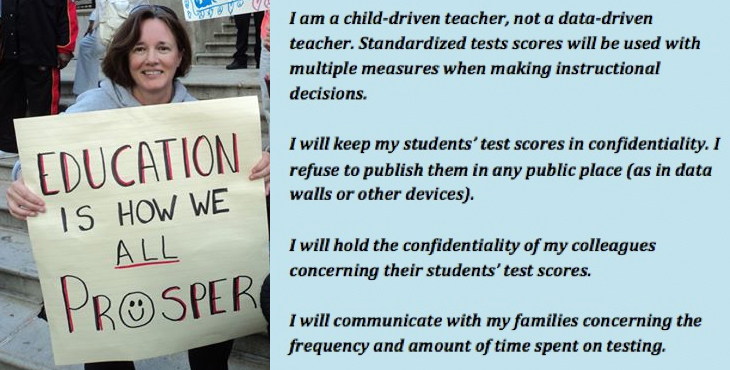I attended the Occupy Department of Education 2.0 protest in Washington, DC, in 2013, and had a chance to spend some time with Chicago elementary teacher Michelle Gunderson. Michelle has become concerned about the myriad ways in which student data is now being used, and she shared with me this Personal Pledge for the Ethical Use of Student Data. She explains why she feels this is needed:
Michelle Gunderson: When I first started teaching in the Chicago Schools standardized tests were used as sorting instruments. Our students were given the Iowa Test of Basic Skills (ITBS), a multiple choice test which involved reading passages, math computation, and math problem solving. At the end of the year, these scores along with grades and teacher recommendations were used to sort kids into piles, and we had classrooms labeled as “high, low, and bi-lingual” at our school.
Then in 1995 with the passage of the Illinois Education Reform Act and the CPS promotion policy, I saw testing as a tool for punishment. Children in 3rd, 6th, and 8th grades were placed in summer school with threat of retention if their scores on the ITBS fell below certain cut scores. Schools were also put on probation and threatened with closings based on test scores.
Now, we see standardized test scores used to justify privatizing our schools. Over and over again our downtown administration starves neighborhood schools of resources and refuses to address the needs of our impoverished students. Then when these schools have low performing test scores, they are closed. Charter schools, which are private enterprises even when non-profit, are opened up to fill this void.
Hence, in my career as a CPS teacher I’ve witnessed standardized testing used to sort, punish, and privatize.
And I am saying enough is enough. I’ve developed a Personal Pledge for the Ethical Use of Student Data. This pledge is my way of communicating to fellow teachers, parents, administrators, and education policy allies my stance on standardized testing. It’s a document that helps codify my moral stance, and it is hoped it will help others take a similar action.
I realize it is just a start. If I could wave a wand and make the tests disappear I would. But I do know that if my school district insists on giving these tests, I can insist upon exercising some control over how they are used.
Please feel free to copy, revise, and share and share this document. I am constantly thinking about and revising my personal thoughts on the use of standardized tests. I welcome any of your insights and suggestions.
What do you think of this ethical pledge?
Michelle Strater Gunderson is a 26 year teaching veteran who teaches fourth grade in the Chicago Public Schools. She is a doctoral student at Loyola University in Curriculum and Instruction.
Originally published on April 9, 2013 on Anthony Cody’s EdWeek blog.
http://blogs.edweek.org/teachers/living-in-dialogue/2013/04/michelle_gunderson_offers_pled.html






chemtchr
There is a new demand for violation of student s’ data privacy rights coming now, and we need to decide as a profession whether we will comply.
The state of Massachusetts has contracted its EDWIN data analytics system to a private firm called Thinkgate, through some kind of shady procurement deal that was approved in Ohio (escaping MA procurement laws), then paid for on an out-of-state purchase order. Last fall, we were instructed to log into their site, where I found my student rosters already entered, with identifying info on every student. A whole day of professional development was devoted to learning how to upload data on our students directly to the out-of-state contractor.
The system can dispense formative and summative evaluations to the students in my sections through me, throughout the year. We were told at the beginning of the year that we are a pilot district. Before June, they said, every teacher was required to test the system by creating three assessments for each student, administering them within the Edwin system, and uploading our students’ responses directly to theThinkgate site for analysis.
The timeline must have shifted, because we heard nothing more about the project; I certainly uploaded no data on my students. Maybe the student privacy pushback put the system on hold.
So, can we add a line to our pledge?
I will not relay my students’ classroom data to any third party contractor.
Duane Swacker
Your first sentence sums my thoughts quite succinctly.
I hope you don’t mind if I plagiarize it substituting “student” for child. (I teach at the secondary level.)
Thanks for bringing up the ethical uses of student data. We don’t hear much about ethical practices from the edudeformers and privateers other than they are the new self proclaimed “civil rights” leaders-what a joke, eh!